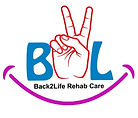When you Should Find a Different Physical Therapist?
- b2lcare

- Nov 11, 2018
- 3 min read

Physical therapists are pretty nice people. They work closely with patients in hospitals, nursing homes, schools, and in outpatient clinics. Some physical therapists even come to your home if you are unable to leave due to functional mobility or travel issues.
If you have had a functional mobility problem and have taken the time to find a physical therapist, most likely you will have a positive experience. Before starting physical therapy, ask a few basic questions to be sure that your physical therapist and the clinic where he or she works is a good fit for you.
Not every physical therapist is a perfect fit for every patient. You may find a physical therapist that is nice but is not really clicking with you. That's fine. But there are some instances when you absolutely must find a different physical therapist (or a different physical therapy clinic)
1. You Have No Rapport With Your Therapist :
When you attend physical therapy, you should feel like you and your physical therapist are engaged in a therapeutic alliance to help you move better and feel better. You don't have to be best pals with your physical therapist, but you should feel comfortable with your physical therapist and feel like a positive therapeutic relationship has been created between the two of you.
Can you have a positive physical therapy experience with very little rapport with your physical therapist? Sure. But if you have attended three or four sessions with your physical therapist and can't remember his or her name, then you probably are not developing a solid rapport with your PT. Maybe it's time to seek out a different therapist.
2.Your Physical Therapist Does Not Listen to You :
All people are biased. It is impossible to get away from it. People have ideas about how things should be done, and sometimes it can be difficult to stray from those ideas and methods.
You physical therapist probably has specific skills and methods that he or she has learned over the years to help treat patients. He or she may be biased to certain treatment methods.
But sometimes those specific methods may not work for you. If that is the case, talk to your physical therapist about changing your rehab program to suit your needs. If your physical therapist is unwilling to modify your treatment program a bit to help you, perhaps you should find a new PT.
3. Your Physical Therapist Only Provides Passive Treatments :
Passive treatments and modalities like ultrasound, traction, or massage feel good. They can also be an important part of your physical therapy program. Passive treatments should never be the only part of your treatment program in physical therapy.
Most studies indicate that active treatments like exercise and postural correction are beneficial for many conditions. Be sure that your physical therapist teaches you about your condition and offers you solutions for self-care to help with your condition.
Passive treatments may only serve to make you dependent on your physical therapist. Active treatments help to give you control over your situation.
4.Lack of Personal Attention and Care :
Your physical therapist is probably a busy person. He or she is likely managing many patients and working to ensure each person receives the best care possible.
Sometimes your physical therapist gets busy, and he or she may be managing one or two patients at a time. But if your physical therapist is bouncing between you and four other patients, then you may want to find a physical therapist who offers more personalized care and attention.
Some physical therapy clinics schedule patients every 15 minutes. Others schedule patients every 20 or 30 minutes. Be sure to ask how long each appointment should last, and ask if your physical therapist "double books" patients. Too much double-booking equals less personal attention for you, so you may want to look for a physical therapist who can offer you more personalized care.
















Comments